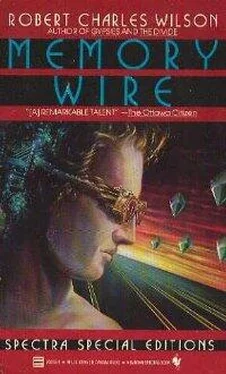Robert Wilson - Memory Wire
Здесь есть возможность читать онлайн «Robert Wilson - Memory Wire» весь текст электронной книги совершенно бесплатно (целиком полную версию без сокращений). В некоторых случаях можно слушать аудио, скачать через торрент в формате fb2 и присутствует краткое содержание. Год выпуска: 1987, ISBN: 1987, Издательство: Bantam Spectra, Жанр: Фантастика и фэнтези, на английском языке. Описание произведения, (предисловие) а так же отзывы посетителей доступны на портале библиотеки ЛибКат.
- Название:Memory Wire
- Автор:
- Издательство:Bantam Spectra
- Жанр:
- Год:1987
- ISBN:978-0-553-26853-9
- Рейтинг книги:4 / 5. Голосов: 1
-
Избранное:Добавить в избранное
- Отзывы:
-
Ваша оценка:
- 80
- 1
- 2
- 3
- 4
- 5
Memory Wire: краткое содержание, описание и аннотация
Предлагаем к чтению аннотацию, описание, краткое содержание или предисловие (зависит от того, что написал сам автор книги «Memory Wire»). Если вы не нашли необходимую информацию о книге — напишите в комментариях, мы постараемся отыскать её.
Memory Wire — читать онлайн бесплатно полную книгу (весь текст) целиком
Ниже представлен текст книги, разбитый по страницам. Система сохранения места последней прочитанной страницы, позволяет с удобством читать онлайн бесплатно книгу «Memory Wire», без необходимости каждый раз заново искать на чём Вы остановились. Поставьте закладку, и сможете в любой момент перейти на страницу, на которой закончили чтение.
Интервал:
Закладка:
But Byron shook his head. “The machine sees, Ray. I don’t see a fucking thing.”
My God, Keller thought. It must be heaven.
He thought later of trying to get access to the recordings, assess his own guilt, look at the thing—somehow— objectively. He put through two formal written requests, but both were denied; the recordings had passed into the archival limbo of Intelligence Evaluation, far beyond the grasp of mortals like himself.
He volunteered for Angel basic. He learned wu-nien. He was earnest about it; he took his wires seriously. In the end he was assigned to a patrol boat policing the quiescent waters of the Rio Negro, and he served out his time without seeing another shot fired.
It didn’t matter. He was a good and thorough Angel now. What was once a habit had become a way of life.
All this with great clarity, compressed into a moment. Her hand opened.
The dreamstone dropped to the carpet of the hotel room in Belem.
Keller rolled away from her, blinking and gasping.
But he had come here for this. It was clear to him now. This resurrection: it had been in his mind since the day Byron said the word ” Brazil.” He had been thinking of Megan Lindsey. He had never stopped thinking of her.
Teresa sat up now, pained and terrified. Byron swiveled his chair away from the phone.
I came here for Meg, Keller thought. As if there were answers here. (There were not.) As if the placid mud out along BR-364 might yield some epiphany after all these years. As if she could come out of the ground and forgive him.
Stupid, inarticulate, idiot thoughts.
Teresa was looking at him now. She mouthed the words: I’m sorry!
Keller looked away.
“That was Denny,” Byron said.
They stared at him.
“On the phone,” Byron said. “He made the arrangements. He found us a flight out of here. He says—Jesus Christ, what happened to you people?”
CHAPTER 15
They had been here, Oberg thought.
The hotel room in Belem was empty now. The windows were open, the yellowed curtains thrown back. Oberg had intimidated the local police, who had intimidated the American expatriate community, and the process had led him here: to an empty room. But not long empty.
Time had been his only real enemy. It was a long journey along the bus lanes from Pau Seco to this noisy Amazon fish town. But they had been here. He could tell.
He made himself silent, concentrated his awareness.
It was something more subtle than a scent. It existed under the reek of the Ver-o-Peso and the ancient dusts of the hotel. It was the trace, Oberg thought, of the oneirolith itself, an alienness lingering in the air. Spoor of other worlds.
He knew, too, where they had gone.
A loose cannon, the Brazilian Chief of Station had called him. Maybe, Oberg thought. Maybe that’s what I am: a loose cannon. But not entirely without direction.
Chief of Station in the American embassy in Brasilia was a ponderously fat Harvard poli-sci graduate named Wyskopf. Oberg had contacted him on his first day in Belem, by phone, more than a week over schedule. It made Wyskopf angry; Wyskopf ordered him in.
“I’m not finished here,” Oberg had said into the eye of the telephone. “I’m very close.”
He could have said something placating, but he had come a long way from Pau Seco and he was too weary to deal with Wyskopf diplomatically. The point of a job, he thought, is to do it. It should have been elementary.
Wyskopf had sighed. He communicated his immense patience down a thousand miles of optical wire. “We work for the same people,” he said. “I’m on your side, all right? But look at it from a broader point of view. We can’t devote an infinite amount of resources to this effort.”
“You want to abandon it?”
“Not that exactly,” Wyskopf said, and Oberg understood suddenly—it startled him—that they did want to abandon it, that Wyskopf was looking for some painless way to tell him so. My God, he thought, they still don’t understand!
“You’re making a mistake,” Oberg said.
“You don’t tell me that. You don’t tell me my job.” Silence for a beat, the sigh again. “It isn’t up to me. I got a call. You’re ordered in. That’s it.”
Oberg squeezed his eyes shut. Three days on the road and he had not slept much. He felt a kind of dizzy aloofness. All of this was talk; none of it mattered. Wyskopf s ignorance offended him, and he told Wyskopf so.
“I have your psych profile,” Wyskopf said. “I could have predicted this. You’re obsessive and you have an avoidance complex you could drive a truck through. I have a raft of complaints on my desk: SUDAM and the military and a half-dozen civil officials. It was a bad decision to send you down here, and anybody asks me, that’s what I’ll tell them. The last thing this office needs is some fucking loose cannon rolling around.” He leaned into the camera. “Refuse my direct order to come in. Do me that favor.”
“You don’t understand. The stone—”
“The stone is gone! It’s time to admit that, don’t you think? The consensus is that nobody on the black market will want it anyway: as a drug, it’s terrible. It’s a horror drug. Leave it alone. Leave it alone and there’s a good chance it’ll disappear out in the Floats somewhere. Meantime we tighten security at Pau Seco and the research facilities’. Sooner or later there’s a leak, it’s inevitable, but by then we have the advantage in basic research.”
“It’s not just that. It—”
“I don’t want to discuss it. This is policy. You understand, Mr. Oberg? You are ordered in from the field. I want you in this office tomorrow morning, and I want you contrite.”
He was stunned. “I can’t do that.”
“You’re refusing?” A certain relish now in Wyskopf’s voice.
“Yes,” Oberg said, “all right, fuck it, I’m refusing. But you don’t understand. You—”
“Shit on that,” Wyskopf said. The screen went blank.
None of them understood.
He went to a bar, sated himself with a meal of feijoada , drank and played wordless pool with three grinning fishermen. He made money and then, still drinking, lost it. Walking down a narrow night street, alone, he thought: I am a soldier and a veteran and a patriot, and I have been closer to this thing than any careerist in any of the federal agencies.
He had been touched by it. Literally.
He had come out of the war twice-decorated and with a thoughtful respect for the horrors of combat. He had seen terrible things, participated in terrible things … but that was the nature of war, and it was not something you could enter into halfway. War was a state of mind, war was all or nothing. It was what they told him in basic. Oberg had been part of a segregated battalion of what the psych people called Latent Aggressives, highly motivated men inured to violence. He hadn’t volunteered for it. His EEG had volunteered him; his genetic map had volunteered him. He had all the earmarks, they said: spike discharge in the cerebellum, periodic episodes of depersonalization, a stunted endorphin system, a history of petty violence. His CO, a rural Georgian named Toller, explained that they were unique because they had all been born without their “bump of sympathy.” And grinned, saying it. God made us what we are. And it was true, wasn’t it? Trite but undeniable.
They called themselves God’s Own. The baseline troops called them Baby killers.
They were terror troops. They penetrated the guerilla-held outlands in a series of punitive raids against posseiro villages, destroying crops, burning buildings, racking down the guerillas’ political and economic base. It was bloody and vile work. They all agreed about that. But it was uniquely their work. God made us what we are.
Читать дальшеИнтервал:
Закладка:
Похожие книги на «Memory Wire»
Представляем Вашему вниманию похожие книги на «Memory Wire» списком для выбора. Мы отобрали схожую по названию и смыслу литературу в надежде предоставить читателям больше вариантов отыскать новые, интересные, ещё непрочитанные произведения.
Обсуждение, отзывы о книге «Memory Wire» и просто собственные мнения читателей. Оставьте ваши комментарии, напишите, что Вы думаете о произведении, его смысле или главных героях. Укажите что конкретно понравилось, а что нет, и почему Вы так считаете.












